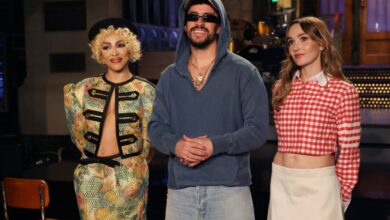Taylor Swift Really Seems to Have a Lot to Say About Matty Healy on The Tortured Poets Department
In the lead-up to Taylor Swift’s latest album, The Tortured Poets Department, released on Friday, the moody imagery and morose snippets of lyrics sprinkled across the internet (“I love you, it’s ruining my life,” for one) made it pretty clear that Joe Alwyn, Swift’s longest public relationship, would not escape the departmental summit unscathed. It was a surprise to many, then, just how much ink Swift spilled seemingly in reference to her brief relationship with The 1975 front man, Matty Healy, on the double album.
On the album’s title track, Swift sings about a lover who leaves a typewriter at her apartment: “I think some things I never say, / Like, ‘Who uses typewriters anyway?’” Anyone can get a typewriter, but that’s just the first hint that the song is about Healy. In a 2018 interview with GQ, Healy spoke about his penchant for typewriters, saying, “The thing with typewriters and writing, putting pen to paper, there’s kind of an element of commitment that goes with the ceremony of it.” He said he preferred the analog implements for his writing, which he described as “dreams of being in love with other pop stars.”
In the chorus of the same song, Swift sings, “You’re not Dylan Thomas, / I’m not Patti Smith, / This ain’t the Chelsea Hotel, / We’re modern idiots.” Dylan Thomas, notably, was a Welsh poet—Healy is British. Smith, like Swift, is American. Then there’s her recalling: “You smoked then ate seven bars of chocolate,” and then there’s the “tattooed golden retriever” falling asleep. Healy is, of course, significantly tatted up, and his band’s song “Chocolate” is about smoking. Get the point?
While “The Tortured Poets Department” scans as eye-rolling directed at a pretentious ex, other references on the album that seem to point to Healy are less gentle, which is why it’s a bit surprising to see an unnamed source allegedly telling Us Weekly that Healy and his family are relieved at his portrayal on the album.
“Matty still thinks very highly of Taylor, but we were all nervous about what she might have said on the album,” the source said, adding that people close to Healy “couldn’t be happier” with the record.
“Matty’s family knew about the relationship,” the source reportedly shared. “And they were worried that Taylor was going to rip him apart. Matty has struggled with life in the public eye, and he’s been doing really well, but the last thing that he needs is for every Swiftie in the world to think he’s a villain.”
But then there’s “I Can Fix Him (No Really I Can),” which seems to point to Healy with references to jokes that are “revolting and far too loud,” and the public’s opinion about Swift’s love life. “They shook their heads, saying, ‘God help her’ / When I told ’em he’s my man.” She returns to that theme on “But Daddy I Love Him,” singing, “I know he’s crazy, but he’s the one I want. / I’ll tell you something right now, you ain’t gotta pray for me. / Me and my wild boy and all of this wild joy. / He was chaos, he was revelry.”
On “The Smallest Man Who Ever Lived,” Swift laments a guy in a “Jehovah’s Witness suit” who tried to buy pills “from a friend of friends of mine” and “sank in stoned oblivion” once they were alone together. Healy often wears a suit while he performs, and he has been open about his history with drug use. Swift then wonders “if rusting my sparkling summer was the goal.” She asks, “Were you sent by someone who wanted me dead?” and whether he was “a sleeper cell spy.” She continues: “It wasn’t sexy once it wasn’t forbidden,” perhaps explaining the abrupt end to the relationship.
There are plenty of musical nods to The 1975 and Healy as well, like the “Guilty as Sin?” line referencing “The Downtown Lights” by The Blue Nile, a song that Healy said inspired The 1975’s “Love It If We Made It,” and his self-proclaimed “favorite band of all time.” The frenetic opening riff of Swift’s “imgonnagetyouback” is a near-twin of The 1975’s “Looking for Somebody (To Love),” and that parenthetical naming convention, a go-to for the band, is mirrored on the aforementioned “I Can Fix Him (No Really I Can).”
Is the song “Peter,” in which Swift pokes at the fading bruise of a past love who is “lost to the Lost Boys chapter of your life” almost certainly a reference to Healy, who has previously referred to himself as “a sort of emo Peter Pan self-lacerating Pied Piper kind of character” and performs a song called “Lost Boys” with his band? It’s certainly not any kind of stretch to believe.
Whether Swifties are seeing Healy in a different light in the post-Poets world is for them to say, but a rising tide lifts all boats: The same day as Swift’s album was released, The 1975’s single “Robbers” obtained platinum certification by the BRITs. Whether the heightened Swift-related interest had anything to do with sales, the singer’s tryst with Healy undeniably put his band on many new listeners’ radars. Being the alleged “smallest man who ever lived” seems to come with a commensurately large payoff.
Representatives for Swift and Healy did not immediately respond to requests for comment.


